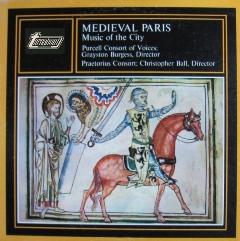Medieval Paris – Music Of The City (1973)
Medieval Paris – Music Of The City (1973)

Side 1: 17:39 1 Adam de la Halle (ca. 1240 - ca. 1286): Du cueur pensieu 2 Anonymous: Chançonnette 3 Jehannot de l'Escurel (? - ca. 1303): Amours, cent mille merciz 4 Anonymous: Hocquet 5 Anonymous: Dieus! Qui porroit 6 Anonymous: Danse real 7 Anonymous: Ave, virgo regia 8 Colin Muset (ca. 1210-1250 of ca. 1230-1270): Quant je vois yver retorner 9 Adam de la Halle: En mai, quant rosier Side 2: 20:12 1 Anonymous: Ductia 2 Anonymous: O Maria, virgo 3 Anonymous: Quant voi l'aloete 4 Pérotin (ca. 1200): Alleluya 5 Anonymous: Un hocquet 6 Anonymous: Amours dont je sui espris 7 Anonymous: Estampie royal 8 Pierre de la Croix: S'amours eust point de poer 9 Anonymous: Veris ad imperia Praetorius Consort Christopher Ball - director Purcell Consort of Voices Grayston Burgess - director
Popular music, usually in the form of secular songs, existed during the Middle Ages. This music was not bound by the traditions of the Church, nor was it even written down for the first time until sometime after the tenth century. Hundreds of these songs were created and performed (and later notated) by bands of musicians flourishing across Europe during the 12th and 13th centuries, the most famous of which were the French trouvères and troubadours. The monophonic melodies of these itinerant musicians, to which may have been added improvised accompaniments, were often rhythmically lively. The subject of the overwhelming majority of these songs is love, in all its permutations of joy and pain. One of the most famous of these trouvères known to us (the great bulk of these melodies are by the ubiquitous "Anonymous") is Adam de la Halle (ca. 1237-ca. 1286). Adam is the composer of one of the oldest secular music theater pieces known in the West, Le Jeu de Robin et Marion. He has also been identified as the writer of a good many songs and verses, some of which take the form of the motet, a piece in which two or more different verses (usually of greatly contrasted content and meter) are fit together simultaneously, without regard to what we now consider conventional harmonies. Such a piece is De ma dame vient! by this famous trouvère. ---ipl.org
download (mp3 @320 kbs):
uploaded yandex 4shared mega solidfiles zalivalka cloudmailru filecloudio oboom








